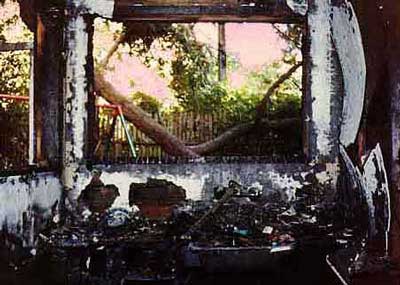
FIRE
Elsa GarcíaWhen she stands here at the window that used to be, she can see the sunset over the houses, over the tree that empties its leaves in winter, leaving a spiderweb of branches that breaks the glare of the horizon. She stands here on the red tile and gazes at the view she never thought she could afford; but it was hers for eight years, until the fire.
The dishwasher still holds dishes. the blackened refrigerator stands open; a whole cooked eggplant, baked by the fire, sits like a polished black sculpture on a shelf. Still life in ash, she thinks, and laughs. What a way to cook an eggplant, to burn down a house around it!
A breeze enters where the window once was. She looks out again. "This did not happen," she says. "This did not happen."
She opens the charred cabinets, salvages a glass, a cup, a twice-baked ceramic dish. She looks at the hole in the floor where the oven had stood and examines the bare studs where there had been a wall. "This did not happen!"
It was just a spark. Less. Just the blackened corner of a pillow charred by a fallen lamp. No, the lamp had not fallen; it had been thrown down in anger. It was the old gooseneck lamp used when painting the room -- once master bedroom, then child's room, since the separation when she had moved to her study and her husband had moved out.
The new paint was a rich, brick red. It covered everything. But wet, one could discern the message painted underneath, in anguish and rage, by a father who had been asked to leave. "Here We Once Loved." The anger left in the room; the anger of the husband and the child fused. Rejection. A world he/they could not control came tumbling down, and the lamp, knocked over, smoldered.
In the morning rush, in the desire to have the children ready for their father to take to school, in her eagerness to avoid argument, she had ignored the danger. She found the smoldering pillow, dampened it too lightly, and tossed it away.
They ate breakfast as usual. When her husband arrived for the children, everything seemed painfully normal. As she left for work, she slid the patio door shut, touched the bag of garbage containing the pillow, felt for any sign of warmth. Just to be sure.
Within three hours, the holocaust. The spark became flame and traveled from garbage bags to boxes, wooden cabinets to cleaning fluids. Then the downstairs bathroom, the playroom, the kitchen, dining room, stairwell, daughter's attic bedroom, son's room, mother's room, second bath. The ceiling, the sky, the tree ... Even the tree. Then the phone call to class, where she stood teaching. "Your house has burnt down."
Burnt down? She rushed home. Disbelief. The dishwasher and dryer lay, burnt shells, on the ground under the half-burnt pine. From the front of the house, all seemed almost normal. Like a Hollywood set, it hardly revealed the chaos and emptiness behind. Later the fire inspector would tell her he had never seen such an intense fire leave the walls standing.
She rushed in, past glass, smoke and ash, picked her way up the fragile stairs, stepping over the black, soggy remains of art books. Her favorites: Kollowitz, Goya, Picasso. Her notebook of poetry still sat on a chair in the middle of the floor, edges singed, but safe.
Where her children might have been, she found grotesque, twisted dolls and toys; the Fischer-Price world, melted, spilling to the floor from shelves, then caught, frozen and suspended where the jet of water had surprised them. Everywhere she looked, melted pieces of their lives whispered: "This could have been the children."
Not one of them had witnessed the disaster. Not one. Even the dog and cat had escaped. "We have our health, our lives," she kept repeating. "Nothing else matters." She said it again and again. "Nothing else matters."
***A year ago. Can it have been a year ago? she wonders. Turning from the window that used to be, she whispers to herself and to the still-standing blackness, "We have our lives...."
Photos of the fire by Elsa García
